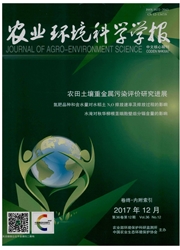

 中文摘要:
中文摘要:
为了解抗生素对雌二醇(E2)降解菌JX-2降解性能的影响,通过药敏试验研究了12种常用抗生素对菌株JX-2的最小抑菌浓度(MIC);采用雌二醇-抗生素联合培养,研究了不同浓度抗生素作用下菌株生物量及降解性能,探讨了混合抗生素分别对纯培养条件下和污水中菌株JX-2降解E2的影响。结果表明,菌株JX-2对青霉素和红霉素的最小抑菌浓度很低,对氯霉素、土霉素和磺胺嘧啶的耐药性相对较高,对其他抗生素的耐药性介于两者之间。低浓度抗生素(MIC)则会明显抑制菌株生长并降低其降解性能。随着时间延长,低浓度抗生素对JX-2降解E2的抑制作用减弱,而高浓度抗生素的抑制作用减弱不明显。当各抗生素浓度为10.0、100.0μg·L^(-1)和1.0 mg·L^(-1)时,混合抗生素对纯培养条件下菌株JX-2降解E2并无影响,而当各抗生素浓度增大到10.0 mg·L^(-1)时,混合抗生素显著抑制了菌株对E2的降解,7 d时E2降解率为48.2%。当各抗生素浓度为10.0、100.0μg·L^(-1)和1.0 mg·L^(-1)时,菌株JX-2对污水中E2具有良好的降解效果,E2降解率达80%以上。
 英文摘要:
英文摘要:
The aim of this work was to investigate the effects of antibiotics on the estradiol(E2)degradation by an estradiol-degrading bac-terium Rhodococcus sp. JX-2. The minimum inhibitory concentration(MIC)of 12 kinds of antibiotics to strain JX-2 was measured by the drug sensitive test. The influence of antibiotics at different concentrations on cell growth and E2-degradation performance by JX-2 was studied using an E2-antibiotics co-cultivation method. The impacts of mixed antibiotics at different concentrations and processing time on E2 degradation in both aqueous solution and sewage were elucidated. Strain JX-2 was observed to be extremely sensitive to penicillin and erythromycin. The drug resistance of strain JX-2 to chloramphenicol, oxytetracycline and sulfadiazine versus other antibiotics was relatively stronger. No significant influence was observed on the growth and E2-degradation performance of strain JX-2 under the stress of antibiotics at low concentrations, but high antibiotic concentrations obviously inhibited the strain JX-2 growth and reduced its E2-degradation perfor-mance. Extending the incubation time weakened the inhibitory effects of antibiotics at low concentrations on E2 degradation, while no such effects were observed for antibiotics at the high concentrations. The mixed antibiotics did not significantly influence the E2 degradation by strain JX-2 in aqueous solution when the antibiotics concentrations were 10.0μg·L-1, 100.0μg·L-1 and 1.0 mg·L-1, respectively. However, the mixed antibiotics significantly inhibited the E2 degradation when the antibiotics concentration increased to 10.0 mg·L-1, and the E2 degradation rate was only 48.2% in 7 days. Strain JX-2 performed well on E2 degradation in sewage when the antibiotics concentrations were 10.0μg·L-1, 100.0μg·L-1 and 1.0 mg·L-1, and the degradation rates were higher than 80%.
 同期刊论文项目
同期刊论文项目
 同项目期刊论文
同项目期刊论文
 期刊信息
期刊信息
